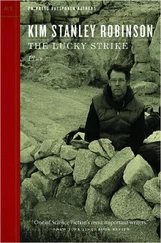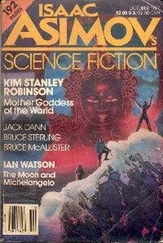“It’ll be a moment.”
“Hold the stove steady—I’ve got to pee.” She stands in the tent doorway, sticks a plastic urine scoop into the open fly of her pants, urinates out the door. “Wow! Sure is cold out. And clear! I can see stars.”
“Great. The wind’s died too, see?”
Eileen crawls back into her bag. They brew their tea with great seriousness, as if mixing delicate elixirs. Roger watches her drink.
“Do you really not remember us from before?” he asks.
“Nooo. . . .” she says slowly. “We were in our twenties, right? No, the first years I really remember are from my fifties, when I was training up in the caldera. Wall climbs, kind of like this, actually.” She sips. “But tell me about us.”
Roger shrugs. “It doesn’t matter.”
“It must be odd. To remember when the rest don’t.”
“Yes, it is.”
“I was probably awful at that age.”
“No no. You were an English major. You were fine.”
She laughs. “Hard to believe. Unless I’ve gone down-hill since.”
“No, not at all. You sure couldn’t have done all this back then.”
“I believe that. Getting half an expedition strung out all over a cliff, people sick—”
“No no. You’re doing fine.”
She shakes her head. “You can’t pretend this climb has gone well. I remember that much.”
“What hasn’t gone well hasn’t been your fault, as you must admit. In fact, given what has happened, we’re doing very well, I think. And that’s mostly your doing. Not easy with Frances and Stephan, and the storm, and Marie.”
“Marie!”
They laugh. “And this storm,” Roger says. “That night climb we did, getting Stephan down!” He sips his tea.
“That was a wild one,” Eileen agrees.
Roger nods. They have that. He gets up to pee, letting in a blast of intensely cold air. “My God that’s cold! What’s the temperature?”
“Sixty below, outside.”
“Oh. No wonder. I guess that cloud cover was doing us some good.” Outside it is still dark, and the ice-bearded cliff face gleams whitely under the stars.
“I like the way you lead us,” Roger says. “It’s a very light touch, but you still have things under control.” He zips the tent door closed and hustles back into his bag.
“More tea?”
“Definitely.”
“Here—roll back here, you’ll warm up faster, and I could use the insulation myself.”
Roger nods, shivering, and rolls his bag into the back side of hers, so they are both on one elbow, spooned together.
They sip tea and talk. Roger warms up, stops shivering. Pleasure of empty bladder, of contact with her. They finish the tea and doze for a bit in the warmth. Keeping the oxygen masks off prevents them from falling into a deep sleep. “Mirrors’ll be up soon.” “Yeah.” “Here—move over a bit.” Roger remembers when they were lovers, so long ago. Previous lifetime. She was the city dweller then, he the canyon crawler. Now . . . now all the comfort, warmth, and contact have given him an erection. He wonders if she can feel it through the two bags. Probably not. Hmmm. He remembers suddenly—the first time they made love was in a tent. He went to bed, and she came right into his little cubicle of the communal tent and jumped him! Remembering it does nothing to make his erection go away. He wonders if he can get away with a similar sort of act here. They are definitely pressed together hard. All that climbing together: Eileen pairs the climbing teams, so she must have enjoyed it too. And climbing together has that sort of dancelike teamwork—boulder ballet; and the constant kinetic juxtaposition, the felt relationship of the rope, has a certain sensuousness to it. It is a physical partnership, without a doubt. Of course all that can be true and climbing remain a profoundly nonsexual relationship—there are certainly other things to think about. But now . . .
Now she is dozing again. He thinks about her climbing, her leadership. The things she said to him back down in the first camps, when he was so depressed. A sort of teacher, really.
Thoughts of that lead him to memories of his past, of the failed work. For the first time in many days his memory presents him with the usual parade of the past, the theater of ghosts. How can he ever assume such a long and fruitless history? Is it even possible?
Mercifully the tea’s warmth, and the mere fact of lying prone, have their way with him, and he dozes off.
The day dawns. Sky like a sheet of old paper, the sun a big bronze coin below them to the east. The sun! Wonderful to see sunlight, shadows. In the light the cliff face looks sloped back an extra few degrees, and it seems there is an end to it up there. Eileen and Roger are in the middle camp, and after ferrying a load to the high camp they follow the rope’s zigzag course up the narrow ledges. The fine, easy face, the sunlight, the dawn’s talk, the plains of Tharsis so far below: All conspire to please Roger. He is climbing more strongly than ever, hopping up the ledges, enjoying the variety of forms exhibited by the rock. Such a beauty to rough plated angular broken rock.
The face continues to lie back, and at the top of one ledge ramp they find themselves at the bottom of a giant amphitheater filled with snow. And the top of this white half bowl is . . . sky. The top of the escarpment, apparently. Certainly nothing but sky above it. Dougal and Marie are about to start up it, and Roger joins them. Eileen stays behind to collect the others.
The technically difficult sections of the climb are done. The upper edge of the immense cliff has been rounded off by wind erosion, broken into alternating ridges and ravines. There they stand at the bottom of a big bowl broken in half; at bottom the slope is about forty degrees, and it curves up to a final wall that is perhaps sixty degrees. But the bottom of the bowl is filled with deep drifts of light, dry, granular snow, sheeted with a hard layer of windslab. Crossing the stuff is hard work, and they trade the lead often. The leader crashes through the windslab and sinks to his or her knees, or even to the waist, and thereafter has to lift a foot over the windslab above, crash through again, and in that way struggle uphill through the snow. They secure the rope with deadmen—empty oxygen tanks in this case, buried deep in the snow. Roger takes his lead, and quickly begins to sweat under the glare of the sun. Each step is an effort, worse than the step before because of the increasing angle of the slope. After ten minutes he gives the lead back to Marie. Twenty minutes later it is his turn again—the other two can endure it no longer than he can. The steepness of the final wall is actually a relief, as there is less snow.
They stop to strap crampons on their boots. Starting again, they fall into a slow steady rhythm. Kick, step, kick, step, kick, step. Glare of light breaking on snow. The taste of sweat.
When Roger’s tenth turn in the lead comes, he sees that he is within striking distance of the top of the wall, and he resolves not to give up the lead again. The snow is soft under windslab, and he must lean up, dig away a bit with his ice axe, swim up to the new foothold, dig away some more—on and on, gasping into the oxygen mask, sweating profusely in the suddenly overwarm clothing. But he’s getting closer. Dougal is behind him. He finds the pace again and sticks to it. Nothing but the pace. Twenty steps, rest. Again. Again. Again. Sweat trickles down his spine, even his feet might warm up. Sun glaring off the steep snow.
He stumbles onto flatness. It feels like some terrible error, like he might fall over the other side. But he is on the edge of a giant plateau, which swoops up in a broad conical shape, too big to be believed. He sees a flat boulder almost clear of snow and staggers over to it. Dougal is beside him, pulling his oxygen mask to one side of his face: “Looks like we’ve topped the wall!” Dougal says, looking surprised. Gasping, Roger laughs.
Читать дальше
Конец ознакомительного отрывка
Купить книгу












